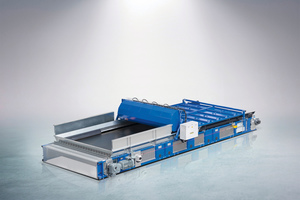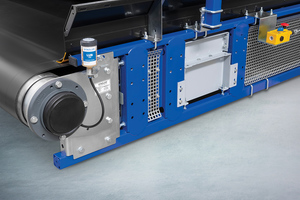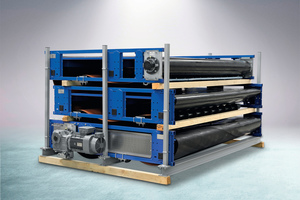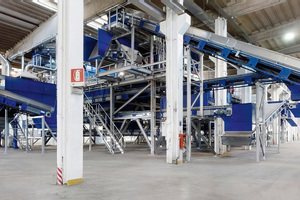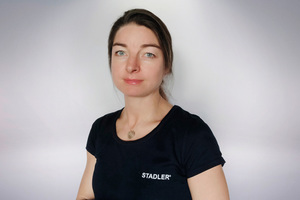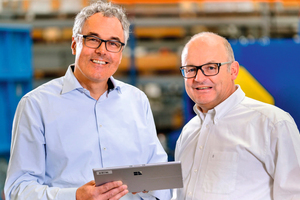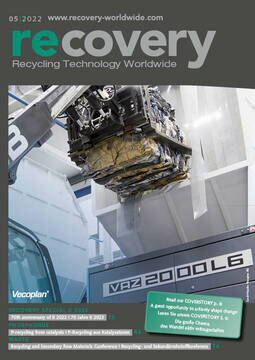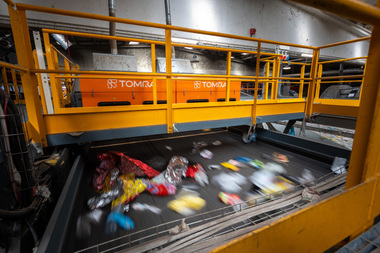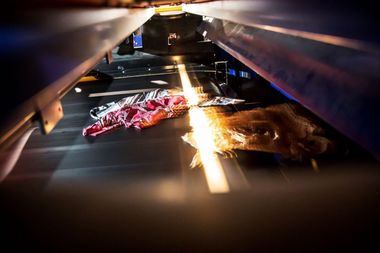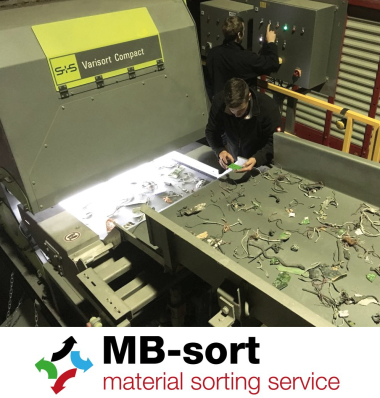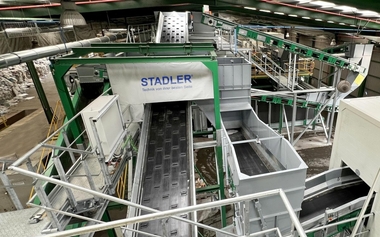New STADLER PX Conveyor raises the bar on purity in sensor sorting
The new STADLER PX acceleration conveyor integrates the best features of the BB and DB conveyors for optical sensor sorting and takes purity to new heights.
The new STADLER PX acceleration conveyor meets the demand for higher throughput in sensor-based automatic sorting, which can operate at higher working speeds. To achieve the desired result, STADLER has integrated the best features of its popular BB and DB conveyors, and has taken the opportunity to introduce a host of improvements. They include a new air stabilizer, which ensures consistent sorting quality at faster speeds with light materials, resulting in excellent purity of the output.
“At STADLER we are always very alert to how our customers’ needs evolve. We are constantly looking at ways to address these changes by improving our products or developing new ones,” explains Corinna König, Team Leader Product Management. “We found that we were increasingly combining our BB and DB conveyors in customers’ projects to achieve the desired result, so we developed the PX, which combines the best features of each into one conveyor. This means that our customers now have only one machine to operate and maintain, simplifying their operation and reducing their costs. And we went further, because we significantly increased the belt speed, even with light materials, so they can increase their throughput with just the one machine – and they can count on consistently high purity levels.”
Italian company Irigom Srl has installed 6 PX conveyors at its SSF (Secondary Solid Fuel) plant, which is designed to separate and recover all valuable material from the incoming plastic waste. The recovered PET, PE-LD and PP is sent to a recycling facility, while the residue is used to produce high-quality SSF. The conveyors have been operating for 3 months, sorting PET, PE-LD and PP materials for recovery, metals, and PVC which is removed from the process. Stefano Montanaro, CEO of Irigom, is impressed with the results: “The PX is performing very well. The fast speed up to 4.5 m/s is allowing us to significantly increase the total material input, while maintaining a very high-quality material in the output.”
High throughput with excellent purity of output fractions
The new PX conveyor carries over the solid frame construction and long service life of its predecessors, the BB and DB models. It features a slot to fit a sensor under the belt and is easily compatible with NIR and EM sensors from a variety of manufacturers. It offers a belt speed ranging from 3.2 m/s to a fast 4.5 m/s, and can be specified with two motors to ensure the necessary torque at the required speed. The head drum is available in a choice of two diameters: 125 mm and 220 mm for the best detachment of the material.
The material on the conveyor is accelerated and straightened, so that the sensors fitted in the slot are able to detect accurately the material on the conveyor at all speeds. An optional stabilizer further improves performance by optimizing the positioning of the material on the belt with an air flow. The result is a higher throughput with consistently high sorting quality and a higher purity levels of the blown-out fraction – even at the top speed with light materials such as paper or film.
Compact dimensions for easy transport
The PX benefits from a compact size and is designed for easy transport. The frame, with the belt already mounted, can be separated into three or four sections, depending on the length of the conveyor. These can be stacked for transport and are simple to reassemble on site. Even the model with the widest, 2900 mm belt can be loaded on standard trucks or containers, also cutting down on transport costs.
Many new developments and good response
STADLER presented new developments at this year‘s IFAT 2022 in Munich, e.g. the mini Label Remover. Recovery had the opportunity to talk to Dipl.-Ing. Willi Stadler, the seventh generation of STADLER Group management, on site.
What began more than 200 years ago as a village blacksmith‘s shop in Altshausen is now a modern, successful premium quality waste sorting plants specialist in design, production and assembly with 500 employees that is increasingly specializing in the construction of conveyor and sorting systems for the recycling industry.
recovery: Mr. Stadler, let‘s start with some feedback here at IFAT 2022, what are the highlights at the STADLER stand and what is the feedback like?
Willi Stadler: We have the impression that people have really been waiting to be able to go to IFAT again. We have had a good response and many visitors to our stand. You just can‘t replace the face-to-face meeting with Teams meetings and video conferences.
recovery: What new products will STADLER be showing at IFAT 2022?
Willi Stadler: We will be exhibiting the new Label Remover, a machine that removes the labels from plastic bottles. This has the advantage that the material the bottles are made of can be better identified and there are fewer impurities in the process during the subsequent washing process. This is our new development. In addition, the Label Remover is insensitive to interfering materials, such as stones, metal, etc.
recovery: How does the Label Remover work, or what is new about the machine?
Willi Stadler: The plastic bottles are fed in from above, and there are beaters in the Label Remover which rotate at different levels. Due to the centrifugal force, the bottles are pressed against the outer wall. There, knives are attached which tear open the labels. In the case of interfering substances, the rotating arms fold back and the interfering substance falls through to the bottom.
recovery: What other new or further developments will you be presenting here at IFAT?
Willi Stadler: We are also very strong in the area of ballistic separators. There are over 1000 STADLER machines in operation worldwide - in USA, Japan, Brazil, Australia and of course in Europe. We offer all types of ballistic separators, whether for plastic sorting plants, LVP plants, for household and commercial waste, for paper or for cardboard separation. New is a separator with a larger working width, an 8-paddle machine.
After all, we are not primarily a machine builder, but a plant supplier. We are always trying to develop even better processes for sorting waste. One goal is the full automation of sorting plants. In Malmö, we manufactured the world‘s first sorting plant for separating textiles. In Norway, STADLER has manufactured the first fully automated sorting plant for household waste. We designed and installed lately in Germany a new state-of-the-art fully automated light packaging sorting plant. In the case of stand-alone machines, we have built a new acceleration belt that we can use for optical sorting systems from all manufacturers. We can run this acceleration belt at up to 4.5 m/s, thus increasing the throughput. We have already supplied 15 of these belts to Italy and have had very good experience there.
recovery: Would you say that development is moving more and more in the direction of digitalization?
Willi Stadler: Exactly, that is the next point, the trend towards digitalization. We want to know what goes into the plant, what goes out at the end. We want to know how good the qualities are, and how high the volume flows are at the critical points. And, of course, it‘s a matter of triggering the subsequent automatic correction or control processes that can be initiated by the measurements. That‘s where we‘re currently in development. The goal is to build a self-optimizing plant.
recovery: In your opinion, what are the biggest challenges in recycling?
Willi Stadler: At the moment there is a huge demand for recycling technology. On the one hand, this is due to the decline in exports of plastic waste to China, and on the other hand, it is caused by EU regulations that state that a certain percentage of household waste must be recycled. In addition, raw material prices are rising and material availability is falling, so it makes even more sense to recycle waste. And that, of course, is how CO2 can be saved. These are all big drivers.
recovery: Is STADLER exclusively involved in plastics and packaging recycling?
Willi Stadler: Two years ago, STADLER acquired a majority stake in weeeSwiss Technology AG, so we are also active in electronic scrap sorting. We are convinced that the share of WEEE will continue to increase in the future.
Mr. Stadler thank you very much for your time here at IFAT and the interesting conversation.

